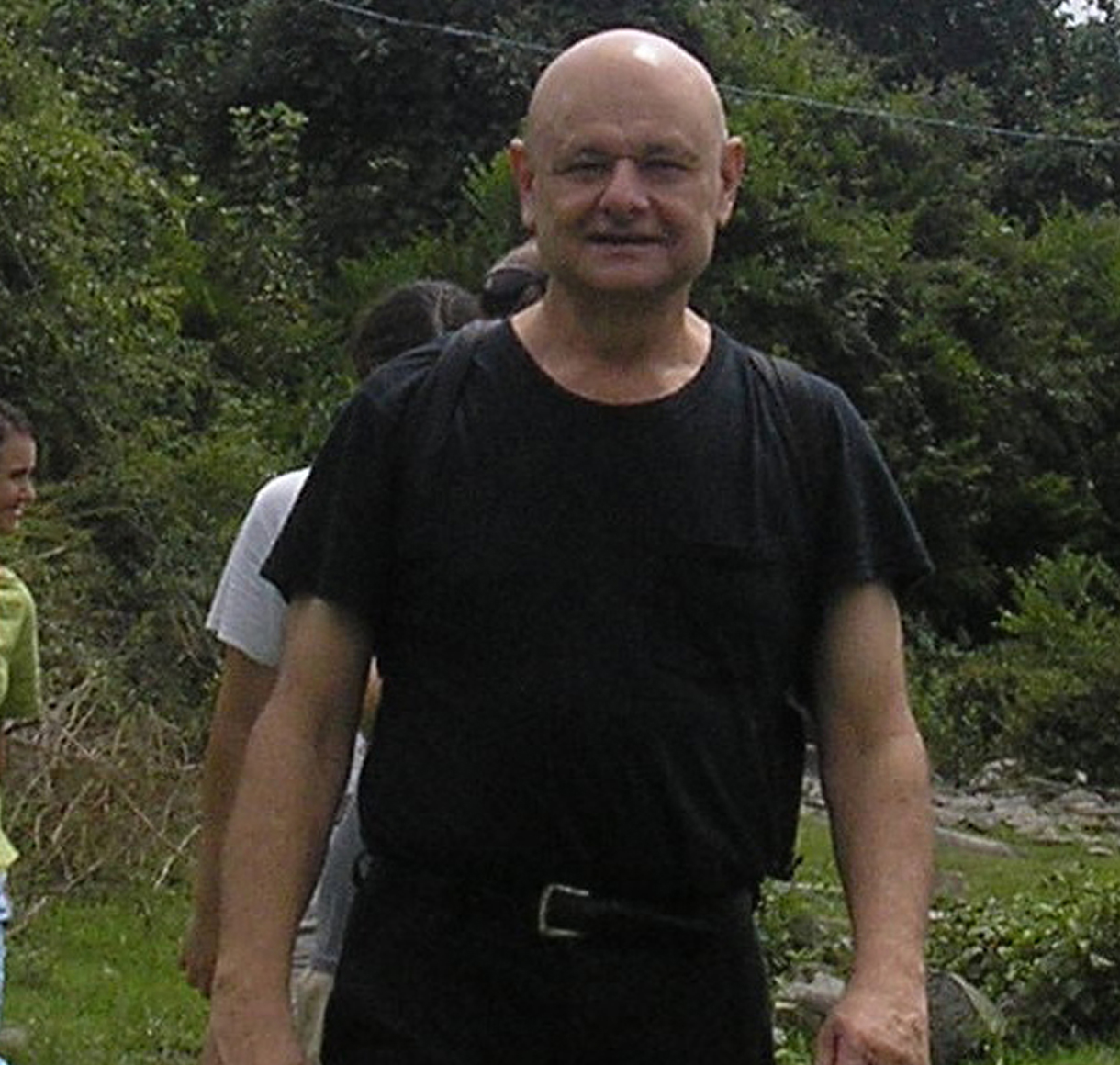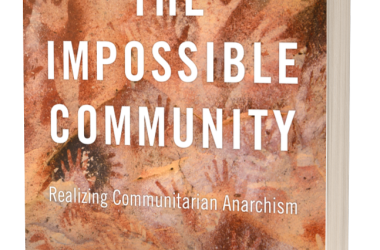By John P. Clark
Murray Bookchin’s political thought is noteworthy for helping to transmit core anarchist ideas of decentralized direct democracy and free federation to several post-60’s generations of anarchists and libertarian socialists. His text, “Theses on Libertarian Municipalism,”[1] was a significant step in the development of that project. Moreover, the work is of more interest at the present moment in history than it has been at any time since it was published. This ground-breaking manifesto in defense of communal participatory democracy was completed in September 1984, and was first published in 1985 in the Canadian anarchist journal Our Generation.[2] On its appearance, the journal’s editors commented that “after several decades of writing critical analysis of historical and contemporary issues, Bookchin initiates a long-awaited and much-needed movement-building perspective.”[3]
The Politics of Cosmology is a thousand-page manuscript by social ecologist and political theorist Murray Bookchin, based on his study of the history of philosophy and his lectures on that topic that were given at the Institute for Social Ecology and to study groups in Burlington, Vermont. I have been familiar with this text since Bookchin gave me several hundred pages of it many years ago, during the time that we worked together closely (during the 1980s and into the early 1990s). More recently, I have been able to read the complete manuscript. Copies have circulated on the internet and have been discussed by a few people.[1] Nevertheless, the details of the work and even its very existence have not been very widely known.
When I first read parts of the text, I thought that it had the potential to become a major work. Indeed, I expected it to be much more important theoretically than Bookchin’s The Ecology of Freedom, a work that I admired as a general vision of social ecology, but nevertheless thought of less as a developed theoretical work than as an introduction to a theory that would be elaborated later in detail. I urged Bookchin to focus on this work, in part because of the promise I saw in it, and in part because I thought that his polemical works directed at deep ecology, neo-Marxism, spiritual ecofeminism, and other tendencies were weakening social ecology theoretically, and postponing the basic theoretical work that had yet to be undertaken. Now that I have been able to evaluate the entire work, and especially the parts that are of central philosophical significance, I am forced to conclude that it did not in the end fulfill its promise. Rather, it exhibits many of the serious problems that emerged in Bookchin’s polemical articles of the late 80s, and that are endemic to his later work, including The Philosophy of Social Ecology, his most explicitly philosophical published work.
I will first make a few general remarks about The Politics of Cosmology and then present a number of very specific points about its content. Initially, I was favorably impressed with the broad scope of the undertaking and the amount of effort that obviously went into it. In addition to possessing these qualities, the text certainly contains some illuminating discussions of the history of ideas, and at times these are presented well. However, the work as a whole has fatal flaws that far outweigh these positive dimensions. On careful reading, it quickly becomes clear that Bookchin’s range of knowledge and his critical abilities were not up to the level of his ambitions. As I will illustrate in detail, many discussions show misunderstandings and naïveté in dealing with fundamental philosophical issues. Furthermore, there are serious misinterpretations of major philosophers, even on some points that are common knowledge among specialists in philosophy and advanced students in the field.
If a work purports to be serious philosophical analysis, it is incumbent on the author to be familiar with the theories that he or she explicates, and especially those that he or she attacks, and to present arguments that show real knowledge of the claims of his or her opponents. Unfortunately, The Politics of Cosmology almost never does this, and when it occasionally does, it does not do it very well. It often suffers from the same flaws as those that afflict Bookchin’s more ephemeral polemical works. This is particularly evident when he indulges himself in complaints about the sad state of the world, the stupidity of his opponents, and the shortcomings of people in general. He sometimes uses straw-man arguments in which he parodies opposing positions, and he attributes views to his opponents that they simply do not hold. The text includes numerous attacks on certain of his favorite targets (analytical philosophy, deep ecology, postmodernism, etc.) that do not contain any citations from the thinkers who are attacked. In these cases, Bookchin substitutes generalized abuse of his opponents for careful analysis and critique of their specific ideas and theories.
Bookchin goes into some detail in his discussions of a number of philosophers and schools of philosophy. This is the case, for example, with the Continental Rationalists, the British Empiricists, Rousseau, and Kant, all of whom will be discussed here. However, he does not really come to grips with many of the core ideas of these philosophers, and he sometimes leads the reader astray in interpreting these ideas. A case in point is his analysis of Descartes. Bookchin badly misunderstands this philosopher’s project, focusing one-sidedly on the view that it is “anchored in subjectivism.” (p. 451) He is aware of the fact that Descartes’ thought represents, as it is famously called, a “subjective turn” in the history of philosophy. What he does not seem to comprehend is the correlative objectivist turn that took place at the same moment. This is a truly dialectical reversal that Bookchin misses entirely. The Cartesian “quest for certainty” was “anchored” (and the word is much more apt in this case) in an ideal of objectivity, for which Descartes, a mathematician, found the model in mathematics as a deductive system. He is thus the father not only of modern subjectivist philosophy but also of modern foundationalism and the quest for an objective basis for truth and knowledge. This is exactly why some contemporary speculative realists, for example, consider themselves Cartesians. They look to Cartesianism as an escape from the subjectivism that they see as pervasive in mainstream Western philosophy. Chomsky (whom Bookchin always looked at with a certain animosity and resentment), is also a professed “Cartesian” rationalist, at least in general inspiration, but is far from being a subjectivist. In fact, Chomsky’s quasi-Cartesian linguistic foundationalism looks to a supposed deep structure of language as a kind of objective basis for resistance to behaviorist and authoritarian forms of conditioning.
While Bookchin’s analysis of Descartes is fundamentally misguided, his treatment of Spinoza exhibits even more weaknesses. He summarizes the diverse literature on Spinoza, which diverges radically from his own views, with the following statement: “If we divest Spinoza of the rubbish that has accumulated around his work by so-called ‘materialist,’[sic] ‘idealists,’ and in more recent times, by California-baked ‘misanthropic ecologists,’ we cannot ignore the striking affinity of Spinoza’s rationalism with that of Aristotle and Hegel…” (p. 513) Bookchin thus alludes to the fact that Spinoza has been a major inspiration in contemporary philosophy. His thought has been an inspiration for Marxists such as Negri and Hardt, for ecological thinkers such as Naess, and for other prominent philosophers such as Deleuze and Guattari. It has also received careful attention from major thinkers on the left such as Badiou and Balibar. Most significantly, there are contemporary anarchist readings of Spinoza that are analyzed at length in Daniel Colson’s “Lectures anarchistes de Spinoza,”[2] and Colson’s own work presents one such reading in one of the most important works in contemporary anarchist thought, his Petit Lexique Philosophique de L’Anarchisme.[3] Bookchin does not cite any of these thinkers, or engage their work in any way. Instead, he casts vague aspersions on the entire philosophical literature on Spinoza, while presenting a position that does little more than recognize the commonplace that Spinoza is an important figure in the rationalist tradition in Western philosophy.
This illustrates one of the greatest shortcomings of the work: its detachment from major currents in philosophy during the time that it was being written. It relies on a limited body of secondary works, primarily from an earlier generation of scholarship, and ignores the widespread reassessment of major figures that was taking place. The sketchy treatment of Spinoza is a glaring example; yet, it is far from atypical. One would also not know from reading Bookchin that Machiavelli has been a topic of widespread debate in contemporary political thought. And most ironically, one finds that even though for most of his life Bookchin worked in the anarchist tradition and considered his own thought to be the fulfillment (and, in the end, the surpassing) of anarchist thought, not only Colson, but anarchist philosophers in general are given almost no attention at all in this quixotic magnum opus manqué of philosophy.
However, the problems with Bookchin’s discussion of Spinoza go far beyond such a neglect of the philosophical literature. They extend to his understanding of basic concepts in that philosopher’s thought. Surprisingly, Bookchin seems confused about what Spinoza meant by the crucial term “attribute.” At one point, he correctly notes that Spinoza specifies two attributes, “thought and extension,” (p. 482) but elsewhere he gives as an example of an attribute the quality “hot.” Spinoza quite clearly and distinctly defines this central concept in his thought as denoting “what the intellect perceives of substance as constituting its essence.” Even if one has read none of the original texts, is difficult for one to think that Spinoza had “hotness” in mind. Furthermore, Bookchin thinks that the fact that Spinoza has an instrumentalist view of animals refutes attempts to find ecological inspiration in that philosopher’s thought. (p. 512) I remember Bookchin long ago recounting with glee his first discovery of “anti-animal” passages in Spinoza and his satisfaction at how devastating this would be to the deep ecologists. Yet, philosophical analysis doesn’t work in this naïve, simplistic way. If one examines a philosophy in depth, one often finds implications that conflict with facile depictions and vague generalizations. The fact that a thinker is not an advocate of “animal rights,” “animal liberation,” or other “pro-animal” positions simply does not imply that there is nothing in that thinker’s thought that has major implications for ecological philosophy.
Serious problems also plague Bookchin’s critique of British empiricism. One of the weakest discussions in the entire work is his treatment of David Hume, who, whether one likes it or not, is widely recognized to be the most influential figure in the history of English-language philosophy. Bookchin correctly sees Hume as a major threat to much of his worldview, but he is unable to come to grips with Hume’s skeptical position and doesn’t seem to understand why philosophers generally take it so seriously. He fails entirely to engage with Hume’s argument, merely saying that he “cannot help but note the crudity of the examples which form a perfect fit with the crudity of the argument.” (p. 616) One could never imagine, based on Bookchin’s dismissive account, how Hume’s “crude” arguments could have “awakened” the great Immanuel Kant “from his dogmatic slumber.” In short, the reader who reads Bookchin without any prior familiarity with Hume’s philosophy will have no idea why major philosophers from Kant to the present have taken his skeptical challenge seriously, and why so many admire Hume’s brilliance, even while disagreeing fundamentally with him.
Some examples may help show the depth of this problem. Bookchin seems amazed by Hume’s statement proposing “That the sun will not rise tomorrow is no less intelligible a proposition, and implies no more contradiction, than the affirmation, that it will rise.” Bookchin concludes that in view of such a position Hume is “distinctly idiosyncratic” in “an age that . . . emphasized an orderly, predictable universe modelled on a machine.” (p. 622) However, Hume’s point is not at all about “predictability,” but about “intelligibility” and “non-contradiction.” The idea of predictability is in fact quite central to Hume’s thought, and his radical empiricism, far from being “idiosyncratic,” was rather quite prophetic in an age in which experimental science and technological innovation were on the rise.
In accord with this empiricism, Hume’s account of causality (which is often called a “regularity analysis”) stresses its basis in the observation of “constant conjunction,” and Humean empiricist science substitutes predictability for any rationalist quest for hidden “universal laws.” Far from questioning the predictability of phenomena, Hume emphasizes the central importance (both psychologically and scientifically) of predictability based on empirical evidence. It is not an exaggeration to say that Hume’s position on this topic is part of basic undergraduate philosophy, but nevertheless, Bookchin does not seem to comprehend it.
Furthermore, in his discussion of Hume’s moral philosophy, Bookchin mentions the crucial issue of the fact-value dichotomy, which derives above all from Hume, and has been a major preoccupation in modern and contemporary ethics. Bookchin opposes Hume’s position, but he never presents an account of it, explains why it has been so important, or gives any argument against it. (p. 623) The case is similar for his significant claim that Hume “tries to argue the self away” but nevertheless “assumes its existence in the very course of his argument.” (p. 627) This claim is never defended. There is neither a clear presentation of Hume’s argument, nor any explanation of precisely how that argument assumes the existence of the self.
Instead, Bookchin merely begs the question (in the strict sense of this term). He quotes the famous passage in which Hume describes what happens when the philosopher “leaves his study” and enters the common-sense world inhabited by the rest of society. Bookchin claims that in this passage Hume admits that skepticism is not “a workable view of reality,” and in doing so presupposes “a sense of selfhood that his philosophy is meant to challenge.” (p. 628) However, none of this is true. Hume’s skeptical analysis presents powerful arguments that we can have no clear idea of the self, and challenges through careful analysis the coherence of the very idea of personal identity. The fact that in everyday life we succumb to certain feelings and beliefs, and that we are creatures of habit, in no way threatens the validity of his argument. His theory of knowledge is in fact an account of how such feelings and beliefs arise in the absence of personal identity or of a clear conception of selfhood.
Bookchin’s presentation of Rousseau’s thought is generally accurate. However, even here Bookchin gets into trouble when he tries to take on one of the most vigorously debated issues concerning the interpretation of that philosopher. He attempts unconvincingly to defend Rousseau from the widely-accepted charge that his idea of “forcing to be free” can have authoritarian implications. Bookchin trivializes the question by equating “forcing to be free” with merely “obliging” lawbreakers “to defer to” the law. He glosses over the fact that Rousseau does not exclude force and coercion as means of “obliging” such “deference.” He shows no understanding of how Rousseau’s conception of freedom fits into the debate over positive versus negative freedom, or of why Rousseau has been seen both as a radical participatory democrat and as a prophet of “totalitarian democracy.” In the end, his account obscures rather than clarifying the deep ambiguities, and indeed contradictions, in Rousseau’s thought. (p.779)
Bookchin’s treatment of Rousseau also exemplifies another problem that occurs periodically in the work. He often relies excessively on direct quotation in the place of a reasonable balance of citation, exposition, and critical commentary. This tendency mars a number of Bookchin’s analyses, but it is particularly flagrant in the case of Rousseau. In about thirty pages of discussion of that philosopher, roughly twelve pages, or forty-percent of the whole, consists of direct quotation. Often Bookchin’s excessive use of direct quotation is accompanied by hasty generalizations concerning a philosopher’s position, and by bare assertions of the superiority of his own ideological position.
Bookchin’s discussion of Kant is, in principle, one of his most important topics, given the enormous stature of that philosopher, and his relation to Hegel, the key figure this entire work. However, it consists mainly of the kind of superficial exposition that is repeated in numerous philosophy textbooks, and it exhibits the excessive use of quotations that was just mentioned. However, Bookchin runs into his most serious problems with Kant when he abandons direct quotations and reliable secondary sources and is left to his own devices. Thus, he points out the dualism inherent in Kant’s distinction between the phenomenal and noumenal realms, but then lapses into crude psychologism when he claims that Kant thought that “the individual is conflicted between his empirical self and his noumenal self.” (p. 780) He also goes astray in his claim that “Kantian morality” is “the result of pure reason.” (p. 761) Kant holds that good moral decision-making results from the exercise of practical reason, as he explains in great detail in his second critique. Despite Kant’s best efforts to make his theory of moral obligation clear, Bookchin seems to think that because Kant’s reasoning is not empirically based that it must therefore be founded on “pure reason.”
There are also numerous problems in Bookchin’s analysis of Hegel, which is the culmination of the entire work. He recognizes Hegel as a towering figure in philosophy and thinks of his own thought as a continuation (and, in his mind, a fulfillment) of the Hegelian dialectic. He claims that in Hegel “we approach . . . a dialectical naturalism that I have advanced as the philosophy of social ecology.” (p. 902) What this means in practice is a distorted, highly Aristotelianized, version of Hegel that ignores the philosopher’s most radically dialectical aspects and reduces dialectic itself to the actualization of potentialities that are inherent within a being. (pp. 905-906)He contends in this chapter that Hegel’s radically dialectical idea of the negation of the negation (which influenced Marx and many others so profoundly) means something as mundane as the process of a tree growing to maturity and producing fruit, after which the process begins again. (p. 906) This serious misunderstanding of dialectic pervades this work and Bookchin’s writings in general.
The Hegel chapter also contains one of the worst examples of Bookchin’s distortion of opposing viewpoints. He spends some time comparing what he conceives of as Hegelian dialectical reason to what he identifies as “analytical reason.” However, he goes on to present an outrageous caricature of analytical thinking. He claims that this form of reasoning cannot be “developmental and organic” but only “factual and structural.” (p. 909) According to his account, it “arrests a development, freezes a segment of it.” (p. 908) But Bookchin seems never to have really thought through the implications of such claims or looked at typical examples of what analytical thinkers do when they analyze. Whether they are natural scientists, social scientists, or philosophers, they certainly quite often present accounts of the “development” of beings and phenomena. His core complaint about analytical reason seems to be that it isn’t teleological, according to his rather neo-Aristotelian conception of immanent teleology. However, he confuses not being teleological with not being “temporal” or “developmental.” In reality, development (temporal, structural, etc.) is a central concern in many varieties of analytical thought, including functionalism, structuralism, and systems theory, one of Bookchin’s favorite objects of attack.
Bookchin claims furher that in analytical philosophy (in supposed contradistinction to dialectical philosophy) “a fact consists precisely of its immutable boundaries and the components that make up its structure.” (p. 909) However, unfortunately for Bookchin, the philosopher who is arguably the most famous figure in the analytical philosophical tradition is Wittgenstein. And probably the most widely cited discussion in Wittgenstein’s works is his analysis of “family resemblances.” There, he points out that the one thing that concepts in ordinary language quite glaringly do not have is “immutable boundaries,” and to think of them as having such boundaries is typical not of “analytical” thinking but of “bad” thinking. It may be true, as Deleuze said, that Wittgenstein was “a catastrophe” for philosophy. But even if this is true, it would in any case be important to know the precise nature of the disaster. Sometimes we can learn a lot from catastrophes, but only if we understand them correctly.
Bookchin is thus rather weak on analytical philosophy, but the single greatest problem in The Politics of Cosmology is Bookchin’s defective presentation of the nature and history of dialectic and dialectical philosophy. This is particularly the case in view of the fact that Bookchin claims to be a dialectical thinker and to speak on behalf of the beleaguered dialectical tradition. Near the beginning of the work, he tellingly gives Aristotle undeserved credit for being a great dialectical thinker, while the details of the Platonic dialectic, which is of enormous importance to the dialectical tradition, is passed over in silence. Late Platonic dialogues that have always been of great interest to dialectical thinkers are not even mentioned by Bookchin. His conception of dialectic is modelled overwhelmingly on Aristotelian teleology, though Bookchin avoids this term because he quite incorrectly thinks that it must necessarily imply a kind of rigid determinism. Bookchin’s neo-Aristotelian evisceration of dialectic does not occur only in the chapter on Aristotle, but is pervasive throughout the text. For example, in the chapter on the Renaissance he claims that dialectic “applies only to developmental processes.” (p. 327). He makes much of the fact that dialectic is more than “motion” and “process,” which is certainly true, but his own idea of dialectic is reductionist and ill-informed. His impoverished conception reduces it to the unfolding of an immanent teleology within beings.[4]
For example, in the discussion of Leibniz’s philosophy, Bookchin describes that philosopher’s “law of continuity,” which posits intermediate gradations between various levels of complexity found in nature, as “almost dialectical.” (p.545) He says that it anticipates “dialectical gradations” in Hegel, by which he means the progressive actualization of a being’s potentialities. (p. 547) He criticizes Hume for using the example of an acorn growing into an oak tree as part of his critique of identity, contending that this phenomenon “is one of the most striking examples of a dialectical development,” while in fact it is just a mundane example of organic growth. The idea of dialectic meaning essentially the movement from potentiality to actuality is also found in the discussion of Rousseau, (p. 710) and forms the core of Bookchin’s interpretation of Hegel’s thought. The Hegel of radical negativity, shocking dialectical reversals, and strikingly anti-intuitive cases of the “cunning of reason” is replaced by a tame, pseudo-dialectical Hegel, the sum of whose philosophical wisdom might be summarized as “great oaks from little acorns grow.”
One reason for Hegel’s undeserved bad reputation in contemporary thought is that the philosopher’s subtle and complex position has been unjustly reduced by opponents to precisely the simplistic teleological one that Bookchin takes it to be. Fortunately, Zizek and others have been exploring radical dialectic in Hegel since the 1980’s, though Bookchin unfortunately never seems to have taken account of this literature. In the end, one of the greatest shortcoming of this thousand-page work is not that it contains a thousand pages of generally inept analysis, but rather that it should, in the name of “dialectical naturalism,” mislead the reader so badly about the meaning of dialectic. Beside this, the fact that a huge, rambling work called The Politics of Cosmology would say almost nothing about cosmology seems almost like a minor detail.
Finally, given the sweeping pretentions of the work, it is impossible not to mention its markedly Eurocentric nature. It touches on our primarily non-European world in the same way that conventional histories of European philosophy do. Non-European thought is accorded attention to the degree that it plays a significant role in the origins and development of European thought. Thus, the history of ideas in the ancient Near East, in ancient Judaism, and in early Christianity are deemed worthy of attention as the crucible of early European philosophy. Granted, in his fourteen pages on medieval Islamic philosophy, Bookchin takes thinkers such as Alfarabi, Avicenna and Averroes seriously, but it is clear that they deserve his attention because they carry on traditions rooted in classical Greek thought, and because their own thought interacted significantly with European philosophy. On the other hand, the bulk of the huge corpus of East Asian and South Asian philosophy does not really exist for Bookchin, other than as the object of the polemics found in many of his works. Buddhist radical dialectic is dissolved into an amorphous sphere of mysticism that can be immediately dismissed. Most of Arab and Persian philosophy, and Islamic philosophy in general, are similarly non-existent. Needless to say, Bookchin sees no need to explore important traditions of African and Latin American philosophy, or the indigenous wisdom that constitutes the philosophy (and cosmology) of much of the world, and which haunts the rest of it.
In the end, this work is instructive, but not as a study of the historical dialectic between politics and “cosmology.” Rather, it is useful for the manner in which it demonstrates how a program of “politics in command” distorts a reading of the history of philosophy. In radically dialectical thought, reason and understanding always remain open to the phenomena, and are formed and reformed by the course of those phenomena. One is tempted to say that radical dialectic is the manifestation in the realm of thought of the principle of “mandar obedeciendo.” In radically dialectical thought, nothing is really in command.
(Thanks to Prof. Michael Pelias of Long Island University and the Institute for the Radical Imagination for helpful comments on this text).
[1] For example, at https://hollaforums.com/thread/1276528/activism/looking-for-the-user-that-posted-politics-of.html. Several addresses where the manuscript was available were posted but were later blocked.
[2] Réfractions 2 (Summer 1998): 119-148.
[3] Paris: Le Livre de Poche, 2001.
[4] For a discussion of this problem throughout Bookchin’s works, see John Clark, “Domesticating the Dialectic: A Critique of Bookchin’s Neo-Aristotelianism” in Capitalism Nature Socialism, vol. 19 #1 (March 2008): 51-68; online at https://www.academia.edu/2546877/_Domesticating_the_Dialectic_A_Critique_of_Bookchin_s_Neo-Aristotelianism_.





